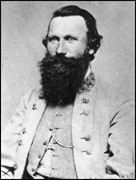Colonial Wars |
American Wars |
Link To This Page — Contact Us —
Major General J.E.B. Stuart
 |
| NAME |
| Stuart, James Ewell Brown |
| BORN |
| February 6, 1833 Patrick City, Virginia |
| DIED |
| May 12, 1864 Richmond, Virginia |
| ARMY |
| Confederate |
Cavalry in May of 1855, with which he served at Fort Leavenworth. He was a veteran of Indian fighting on the plains and spent most of the next 6 years in Kansas.
In 1855, he married Flora Cooke, the daughter of future Union Major Gen. Philip St. George Cooke and was promoted to 1st lieutenant. In the summer of 1859, he traveled east to sell the rights to his invention, a device to hold a cavalry saber to a belt, to the War Department. He carried secret instructions for Col. Robert E. Lee to proceed to Harpers Ferry to crush John Brown's raid. Stuart, volunteering as aide-de-camp, went along and read the ultimatum to Brown before the assault in which he distinguished himself. After this, Stuart returned to Kansas.
In May of 1861, after Virginia seceded, Stuart resigned his commission in the U.S. Army, and became a Colonel in the Confederate cavalry. He was commissioned Lieutenant Colonel of Virginia infantry on May 10, with orders to report to then Col. Thomas J. Jackson at Harper's Ferry, and was promoted Colonel July 16th. Leading the charge that helped the Confederacy win 1st Bull Run, was promoted to Brigadier General on September 24. He trained his cavalry unit to become a polished and efficient fighting force by the end of 1861.
During the Peninsula Campaign, he scouted to find out where the Union forces were located. He covered the Confederate retreat from Yorktown, opening the fighting at Williamsburg. After the Federals had approached Richmond, he won the admiring attention of both nations by his brilliant ride around Gen. George B. McClellan's Army of the Potomac. This action cheered up the Confederates, providing them with information on Union whereabouts and demonstrating the scouting capabilities of Confederate intelligence. Stuart led troops in the Seven Days' Campaign, and was promoted to major general on July 25, 1862.
Given command of the cavalry of the Army of Northern Virginia right before the 2nd Bull Run, he demonstrated superior performance. Stuart also fought well in the Antietam Campaign, although he was unable to destroy an iron bridge over the Conococheague Creek during his Chambersburg Raid aid. He also participated in the battle of Fredericksburg, the Chancellorsville Campaign and the Gettysburg Campaign.
At Chancellorsville, he took over command of " Stonewall" Jackson's II Corps after he had been mortally wounded by his own men. Returning to the cavalry shortly after, he commanded the Confederate cavalry in the largest cavalry engagement ever fought on the American continent, Brandy Station, on June 9, 1863.
He was late for the battle of Gettysburg, however, and his tardiness contributed to the Confederate defeat. During Gettysburg, Stuart, acting under ambiguous orders, circled the Union army, but in the process deprived Lee of his eyes and ears while in Union territory. Arriving late on the second day of the battle, Stuart failed the next day to get into the Union rear flank, being defeated by Gens. Gregg and Custer. His cavalry saved the Confederate trains at Williamsport, on the retreat.
In the spring of 1864, however, he stayed in close contact with the rest of the Confederate forces, and kept Lee informed of Union movements. Stuart was known as the "Cavalier of Dixie," and Lee considered him the "eyes of the army."
In May of 1864, being called southward by Major Gen. Philip H. Sheridan's raid, Stuart interposed his cavalry between the Federals and Richmond at Yellow Tavern, where, on May 11th, he was mortally wounded by a Union cavalryman. He died at Richmond on the following day. The death of Stuart produced a gloom in the South, second only to that which followed the loss of Jackson. His last words were, "I am going fast now; I am resigned. God's will be done."As he uttered these words, he died. He died on May 12th and was buried in Hollywood Cemetery.
Stuart was probably the most famous cavalryman of the Civil War. Like his intimate friend, "Stonewall" Jackson, As a soldier, he was a born leader. He soon became a legendary figure, ranking as one of the great cavalry commanders of America. Twice he led his command around McClellan's army, once in the Peninsula Campaign and once after the battle of Antietam. His death marked the beginning of the decline of the superiority which the Confederate horse had enjoyed over that of the Union.
Promotions:
- Lieutenant Colonel - May 10, 1861
- Colonel - July 16, 1861
- Brigadier General - September 24, 1861
- Major General - July 25, 1862
Major Commands:
- Army of Northern Virginia, Cavalry Brigade (October 22, 1861 - July 28, 1862)
- Army of Northern Virginia, Cavalry Division (July 28, 1862 - September 9, 1863)
- Army of Northern Virginia, II Corps (May 3-6, 1863)
- Army of Northern Virginia, Cavalry Corps (September 9, 1863 - May 11, 1864)
